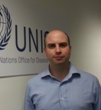Keynote speakers
Barbara Zanuttigh
Barbara Zanuttigh is assistant Professor in Hydraulics at the Faculty of Engineering of the University of Bologna since October 2006.
The scientific research of Barbara Zanuttigh is mainly related to the field of the Maritime and Environmental Hydraulics, more specifically coastal flooding and erosion in a changing climate; wave energy converters: design optimization for combined energy production and coastal protection purposes; eco-compatible interventions for beach defence planning; experimental and numerical investigation of hydro-morphodynamics around coastal defences.
She is author of more than 100 publications in international journals and conference, achieving a h-index equal to 12 (Scopus).
Besides being the coordinator of the THESEUS project, she is involved in many National, International and European projects including Mermaid, SDWED and Ritmare.
Mark Adamson

After working for a number of years with consultants Mott MacDonald based in the UK, Mark joined the Office of Public Works in Ireland where he is now Head of the Flood Relief and Risk Management Division. He oversees the national flood risk assessment, mapping and management planning programmes, the implementation of the EU ‘Floods’ Directive in Ireland, and the technical aspects of flood relief schemes. Mark was also the Project Manager for the preparation of the Guidelines on the Planning System and Flood Risk Management.
Mark is currently co-chair of Working Group F (WGF), the EU Working Group on Floods.
Demetrio Innocenti

Demetrio Innocenti joined the United Nations Office for Disaster Risk Reduction in 2008. He is engaged in the implementation of integrated disaster risk management policies and programmes in Europe and CIS, with a specific focus on the linkages between disaster risk reduction and climate change adaption and regional/national disaster risk financing options. He previously worked in disaster risk management and rural development in Africa and South East Asia with private development organizations and UN specialized agencies such as FAO.
Robert Nicholls
Robert Nicholls is Professor of Coastal Engineering, Deputy Head of School (Research) and Co-Director of the University-wide Centre for Coastal Processes, Engineering and Management.
His main technical areas of interest are long-term coastal engineering and management, especially the issues of coastal impacts and adaptation to climate change, with an emphasis on sea-level rise. Particular interests include Coastal implications of climate change: impacts and responses; Integrated assessment of coastal areas; Large-scale coastal morphological behavior; Soft coastal engineering; Shoreline management.
He is currently a Programme Leader in the Tyndall Centre for Climate Change Research, he's also contributing to the OECD study of "Climate Impacts for Port Cities" and the NERC QUEST Programme "Global Scale Impacts Study" and he will conduct the coastal assessments in the EU Programme "Climate Costs". He's involved in the Intergovernmental Panel for Climate Change (IPCC) working groups and was lead author of chapters in four reports of the IPCC.
Hans Burcharth
Hans Burcharth is professor at the hydraulics and Coastal Engineering Laboratory of Aalborg University.
His professional experience and interests fall within the areas of hydrodynamics and hydraulics; breakwater, quay, jetty and coastal protection structures; offshore structures such as oilrigs and marine pipelines; material science (wood, concrete, rock); environmental engineering related to ground water, costal zones, rivers and lakes; hydraulic structures such as high dams, canals, locks; and conventional civil engineering structures.
Within THESEUS he’s involved in the design of innovative coastal defence structures adapted to climate change.
Richard Thompson
Richard Thompson is since 2010 professor Marine Biology at the School of Marine Science and Engineering of Plymouth University.
His research focuses on three main topics: the effects of plastic debris in the marine environment, the ecology and conservation of shallow water habitats and habitat modification to enhance biodiversity of marine engineering such as coastal defences and off-shore renewable energy devices. His over arching research interests are on the ecology and conservation of shallow water habitats and has numerous peer-reviewed publications on this theme.
Within the THESEUS project he’s involved in research on the effects of coastal defence structures on the ecosystem and the development of eco-compatible coastal defence structures.
Jean-Paul Vanderlinden
Since 2007, Jean-Paul Vanderlinden is Professor in Environmental studies and Ecological Economics at Université de Versailles Saint-Quentin-en-Yvelines. He studied Agronomy at the Université Libre de Bruxelles (1984-1989), Economy at Moncton University (1994-1995) and did a PhD on Environmental Studies at York University in Toronto (1996-2002).
Within the THESEUS project he’s involved in the research on risk perception and communication and damage assessment.
Philippe Quevauviller

Philippe Quevauviller has been working as a researcher in marine geochemistry during the years 1983-1989, and joined the Research General-Directorate of the European Commission where he has been scientific officer from 1989 until 2002 on topics dealing with the quality control of environmental analysis. Since 2002, he has joined the Water & Marine Unit of the EC Environment Directorate-General. He chaired two working groups of the WFD Common Implementation Strategy (CIS) on Groundwater and Chemical Monitoring Activity, based on which several guidance documents were developed.
Since October 2008, he is managing research projects concerning climate change impacts on water systems/resources and natural hazards.








